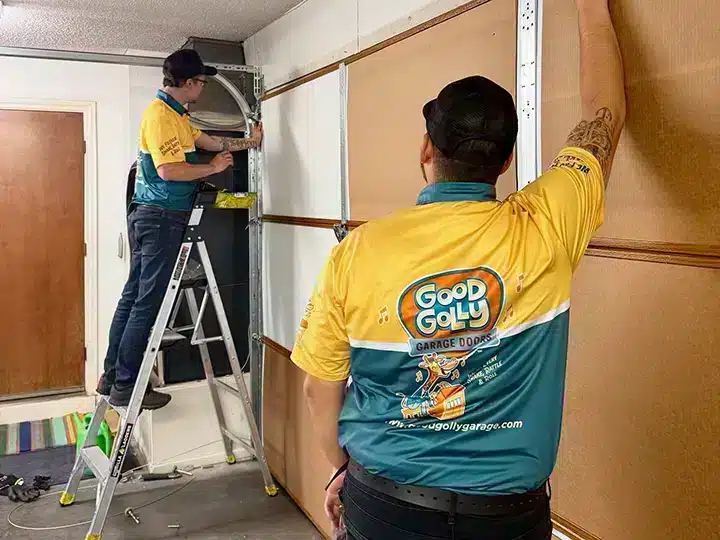7 Garage Door Noises You Shouldn’t Ignore (And What They Mean)
Expert Garage Door Services Powered by Good Golly Garage Doors
7 Garage Door Noises You Shouldn’t Ignore (And What They Mean)
Expert Garage Door Services Powered by Good Golly Garage Doors

Most of us use our garage doors every day without thinking twice—until they start making sounds that don’t feel quite right. Maybe it’s a squeak. A bang. A low, grinding groan. Whatever the noise is, your garage door is trying to tell you something.
And in Las Vegas, where heat and dust can wear out components faster than expected, those strange sounds can be an early warning sign of a serious issue.
Below, we’ve broken down seven common garage door noises, what they typically mean, and whether you should call in the pros for help. If your garage door has been talking back lately, this guide is for you.
Contact Us1. Grinding = Worn-out rollers or misaligned tracks
A grinding sound—especially when the door is in motion—often means your rollers are dragging instead of rolling. In many Las Vegas garages, dust buildup or lack of lubrication can accelerate roller wear.
If left unchecked, this can damage the tracks or place unnecessary strain on the opener. Cleaning the tracks and applying the right lubricant may help, but if the noise persists, it’s time for garage door maintenance in Las Vegas.
2. Squeaking or screeching = Dry hinges or rollers
A high-pitched squeak during opening and closing is one of the most common complaints—and one of the easiest to fix.
This usually means the metal parts need lubrication. Apply a silicone-based spray to the rollers, hinges, and springs, avoiding WD-40. If the squeaking continues, the parts may be worn out or rusted and need replacing. Regular garage door maintenance can help catch this before it becomes a full-blown repair.
3. Rattling = Loose nuts, bolts, or opener supports
If your door sounds like it’s about to shake itself apart, you could be dealing with loose hardware. Vibrations from regular use (especially in homes with older doors) can loosen brackets, screws, and even the garage door opener mounting.
Tightening visible bolts can help, but if the rattling comes from deeper within the system—or near the opener—it’s best to schedule a garage door repair in Las Vegas.
4. Popping or cracking = Tension changes in the springs
Popping noises when the door moves can be caused by your torsion springs expanding and contracting. In desert climates, where temperature changes can be extreme, this happens more often.
This sound might seem minor, but it could point to a spring nearing the end of its lifespan. And since springs are under high tension, trying to adjust or replace them yourself is dangerous. If you hear this, it’s smart to get a professional garage door spring inspection.
5. Thudding or banging = The door is unbalanced or slamming shut
A sudden thud as your garage door closes could mean it’s slamming down too fast. That usually means the door is off balance or your springs or cables are failing.
This isn’t just a sound issue—it’s a safety issue. A free-falling garage door can seriously damage property or injure someone. If your door seems heavier than usual or doesn’t stay in place when half-open, stop using it and schedule urgent garage door cable repair.
6. Buzzing or humming = Motor strain or opener malfunction
If you hear a low humming or buzzing noise, especially when the door isn’t moving, your garage door opener could be struggling.
This could be due to motor strain, an electrical issue, or an opener nearing the end of its life. Before assuming the worst, check your sensors and remote batteries. If the noise continues or the door starts moving erratically, a pro should inspect your garage door opener system.
7. Whistling or whooshing = Air gaps and worn weather seals
This sound is subtle but more common than you might think, especially on windy days. If you hear a whistling noise, it’s likely air slipping through gaps around the door. That’s often caused by damaged or missing weather stripping.
Beyond the annoyance, these gaps can invite dust, pests, and temperature fluctuations into your garage. Replacing your seal can be a quick fix—check out our weather stripping and sealing services if you suspect your seal has worn out.
DIY fixes vs. Calling a pro
Some garage door noises are harmless and can be handled with a little know-how and the right tools. Lubricating hinges, tightening a few bolts, or replacing the bottom seal are all within reach for most homeowners.
But other issues—like broken springs, unbalanced doors, or electrical opener malfunctions—can be dangerous to tackle alone. If you’re not 100% sure what’s causing the noise, it’s worth scheduling a professional inspection.
Whether you need a quick tune-up or a full garage door installation, getting ahead of strange sounds can save you from unexpected repairs down the road.
Schedule a free inspection for your noisy garage door
Your garage door is one of the hardest-working systems in your home. If it’s making noises that don’t sound right, don’t wait until something breaks.
At Good Golly Garage Doors, we know what the desert climate does to doors—and how to keep yours running smoothly. Contact us today to book a professional garage door inspection in Las Vegas.
We’ll take care of the noises. You take care of everything else.
Contact Us



